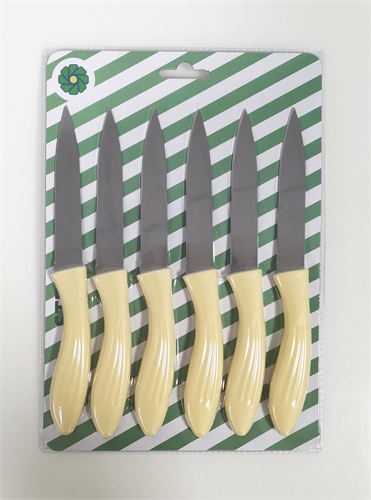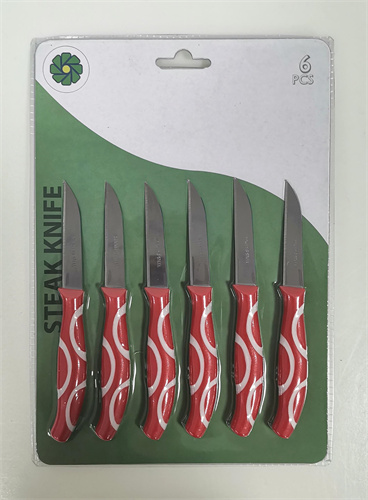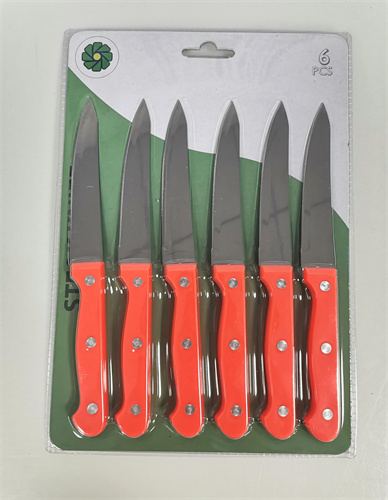

Views: 800 Author: sales@insightknife.com.cn Publish Time: 2025-01-06 Origin: Site








Content Menu
● Understanding Blade Materials
>>> Advantages of Stainless Steel
>>> Disadvantages of Stainless Steel
>>> Advantages of High-Carbon Steel
>>> Disadvantages of High-Carbon Steel
>> Ceramic
● Factors Influencing Longevity
>> Hardness
>> Usage
● Frequently Asked Questions regarding Steak Knives
>> 1. What is the best material for a steak knife?
>> 2. How often should I sharpen my steak knife?
>> 3. Can I use a steak knife for other types of food?
>> 4. How should I care for my steak knife to ensure longevity?
>> 5. Are ceramic steak knives worth the investment?
Steak knives are essential tools in any kitchen, particularly for those who appreciate a good steak. The longevity and performance of these knives are significantly influenced by the materials used in their blades. This article explores the various blade materials commonly used in steak knives, their properties, and how they affect the knife's durability and performance.
Stainless steel is one of the most popular materials for steak knife blades. It is known for its corrosion resistance, strength, and ease of maintenance. The composition of stainless steel typically includes chromium, which helps prevent rust and staining. This material is often favored in both home and professional kitchens due to its reliability and aesthetic appeal.
Corrosion Resistance: Stainless steel blades are less likely to rust, making them ideal for use in moist environments, such as kitchens. This property is particularly beneficial for those who may not have the time or inclination to perform extensive maintenance on their knives.
Durability: These blades can withstand significant wear and tear, maintaining their integrity over time. The robustness of stainless steel means that it can handle the rigors of daily use without easily becoming damaged.
Ease of Maintenance: Stainless steel knives are relatively easy to clean and do not require special care. A simple wash with soap and water is often sufficient, making them a practical choice for busy households.
Edge Retention: While stainless steel can hold a sharp edge, it may not retain its sharpness as long as other materials, such as high-carbon steel. This means that users may need to sharpen their stainless steel knives more frequently, which can be a drawback for those who prefer low-maintenance options.
Brittleness: Some stainless steel blades can be brittle, leading to chipping if not handled properly. This brittleness can be a concern for users who may inadvertently apply excessive force while cutting.


High-carbon steel is another common material used in steak knives. This type of steel contains a higher percentage of carbon than stainless steel, which enhances its hardness and edge retention. High-carbon steel knives are often favored by chefs and culinary enthusiasts who prioritize performance and precision in their cutting tools.
Sharpness: High-carbon steel can be honed to a finer edge, allowing for cleaner cuts through meat. This sharpness is particularly important for steak knives, as it enhances the overall dining experience by providing smooth, effortless slicing.
Edge Retention: This material tends to retain its sharpness longer than stainless steel, reducing the frequency of sharpening. For those who use their knives regularly, this can be a significant advantage, as it minimizes downtime for maintenance.
Corrosion Susceptibility: High-carbon steel is more prone to rust and staining, requiring more maintenance to keep it in good condition. Users must be diligent about cleaning and drying their knives after use to prevent corrosion, which can be a drawback for those seeking convenience.
Brittleness: Similar to stainless steel, high-carbon blades can be brittle, especially if they are not properly tempered. This brittleness can lead to chipping or breaking if the knife is subjected to improper use, such as cutting through hard materials.

Ceramic blades are made from zirconium oxide, a material known for its hardness and ability to maintain a sharp edge. While less common in steak knives, ceramic blades offer unique advantages that can appeal to specific users, particularly those who prioritize sharpness and low maintenance.
Edge Retention: Ceramic knives can maintain their sharpness for a longer period compared to metal blades, reducing the need for frequent sharpening. This characteristic makes them an attractive option for those who want a knife that stays sharp with minimal effort.
Lightweight: Ceramic blades are generally lighter than their metal counterparts, making them easier to handle. This lightweight nature can be particularly beneficial for individuals who may struggle with heavier knives, allowing for more comfortable and controlled cutting.
Brittleness: Ceramic blades are more fragile and can chip or break if dropped or subjected to excessive force. Users must exercise caution when using and storing ceramic knives to avoid damage, which can be a limitation for those who prefer more robust options.
Limited Use: Ceramic knives are not suitable for cutting through bones or hard materials, which limits their versatility. While they excel at slicing soft foods, their inability to handle tougher tasks may necessitate the use of additional knives in the kitchen.
The hardness of a blade material is a critical factor in determining its longevity. Harder materials can withstand more wear and tear, maintaining their sharpness longer. However, increased hardness can also lead to brittleness, making the knife more susceptible to chipping. Understanding the balance between hardness and brittleness is essential for selecting a knife that will last.
The maintenance required for different blade materials varies significantly. Stainless steel knives typically require less maintenance than high-carbon steel knives, which need regular oiling and careful cleaning to prevent rust. Ceramic knives, while low-maintenance in terms of sharpening, require careful handling to avoid chipping. Users should consider their willingness to perform maintenance when choosing a knife material.
The way a steak knife is used can also impact its longevity. Knives that are used frequently for tough cuts of meat may wear down more quickly than those used for softer foods. Proper cutting techniques, such as using a cutting board and avoiding hard surfaces, can help extend the life of any knife. Additionally, using the knife for its intended purpose—slicing rather than prying—can significantly enhance its durability.
The choice of blade material in steak knives plays a crucial role in their longevity and performance. Stainless steel offers durability and ease of maintenance, while high-carbon steel provides superior sharpness and edge retention. Ceramic blades, though less common, offer unique benefits for specific uses. Understanding these materials and their properties can help consumers make informed decisions when selecting steak knives that will last for years to come.
By considering factors such as hardness, maintenance requirements, and usage, individuals can choose the right steak knife that not only meets their culinary needs but also stands the test of time. Investing in a quality steak knife made from the appropriate material can enhance the dining experience, making every meal more enjoyable and memorable.
The best material for a steak knife depends on personal preference and usage. Stainless steel is popular for its corrosion resistance and ease of maintenance, while high-carbon steel is favored for its sharpness and edge retention. Ceramic knives offer excellent sharpness but are more fragile.
The frequency of sharpening a steak knife depends on the blade material and usage. High-carbon steel knives may need sharpening every few weeks with regular use, while stainless steel knives might require sharpening every few months. Ceramic knives can maintain their edge for longer but should be sharpened with specialized tools.
While steak knives are designed primarily for cutting meat, they can also be used for other foods like bread or soft vegetables. However, they are not suitable for cutting through hard materials or bones, as this can damage the blade.
To ensure the longevity of your steak knife, clean it immediately after use with warm, soapy water and dry it thoroughly. Avoid using abrasive materials that can scratch the blade. For high-carbon steel knives, apply a light coat of oil to prevent rust. Store knives in a designated knife block or sheath to protect the blades.
Ceramic steak knives can be worth the investment for those who prioritize sharpness and low maintenance. They stay sharp longer than metal knives and are lightweight. However, their fragility and limited versatility may not make them suitable for everyone, especially those who require a more robust knife for various tasks.